Comparative Analysis of CSR Strategies in Micro, SME, and MNCs
VerifiedAdded on 2022/08/26
|14
|3545
|38
Report
AI Summary
This report delves into the realm of Corporate Social Responsibility (CSR), examining the diverse approaches adopted by microenterprises, SMEs, and multinational corporations (MNCs). It explores the concept of sustainable business strategy and management, highlighting the significance of the triple bottom line (TBL) approach, which encompasses economic, environmental, and social impacts. The report analyzes CSR strategies of prominent companies like Unilever, Samsung Electronics Limited, Citi Bank, and Samsung C&T Corporation, illustrating how they integrate sustainability into their core operations. Furthermore, it investigates the importance of CSR for micro businesses and SMEs, discussing the challenges they face and the benefits they can derive from implementing CSR initiatives. The analysis reveals similarities and differences in the CSR approaches across different business sizes, emphasizing the role of CSR in enhancing goodwill, profitability, and stakeholder engagement. The report concludes by emphasizing the significance of CSR in the current business landscape.
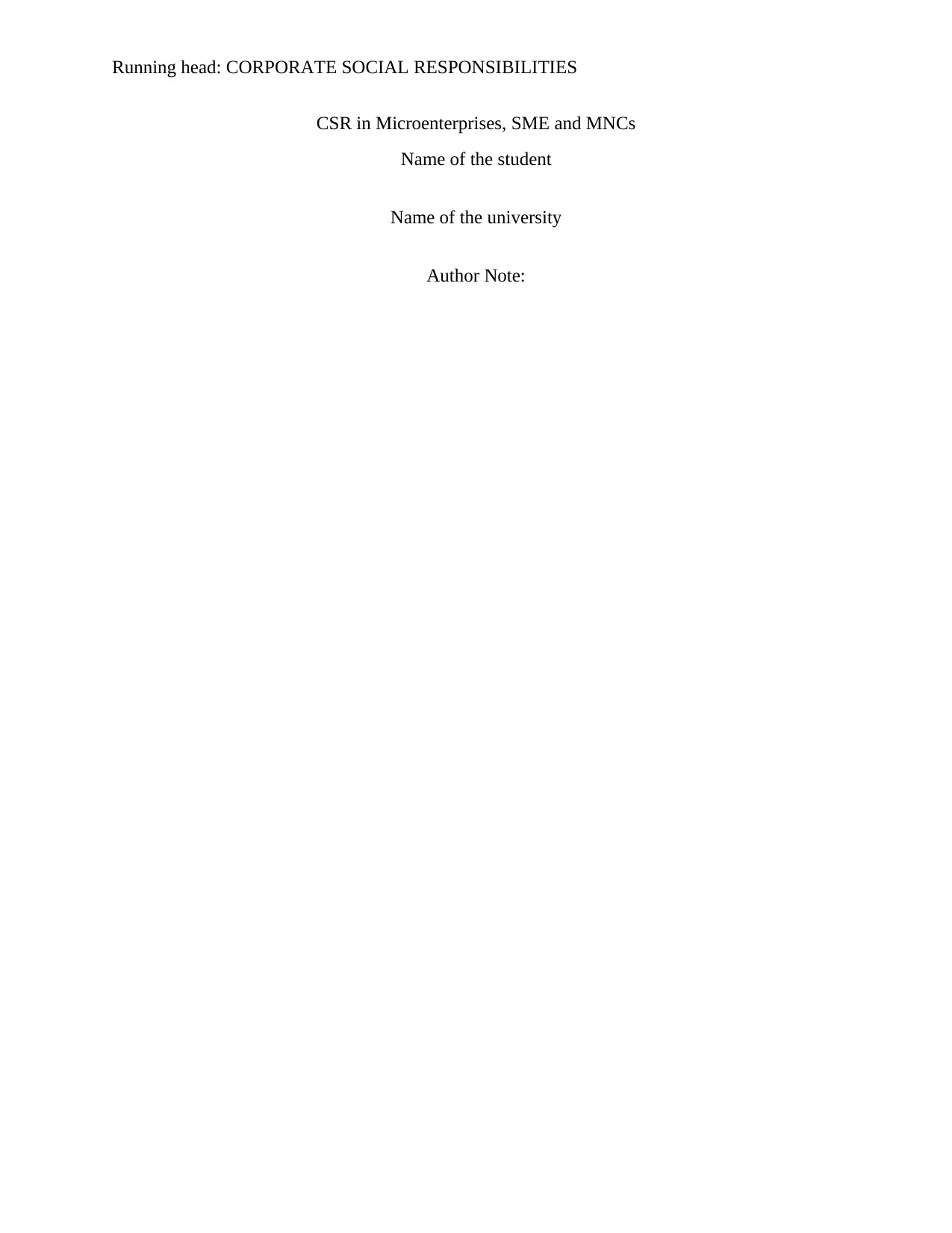
Running head: CORPORATE SOCIAL RESPONSIBILITIES
CSR in Microenterprises, SME and MNCs
Name of the student
Name of the university
Author Note:
CSR in Microenterprises, SME and MNCs
Name of the student
Name of the university
Author Note:
Paraphrase This Document
Need a fresh take? Get an instant paraphrase of this document with our AI Paraphraser
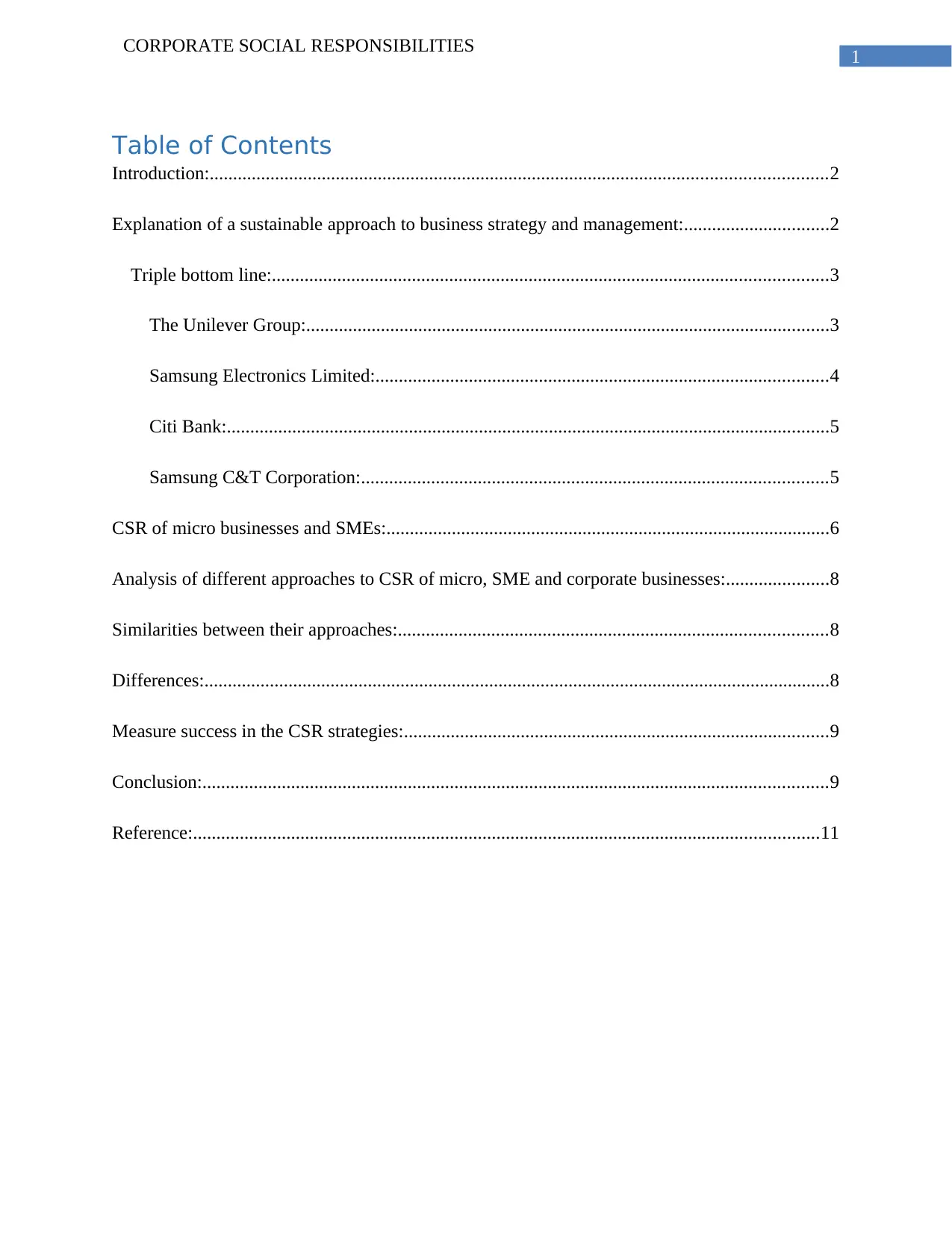
1
CORPORATE SOCIAL RESPONSIBILITIES
Table of Contents
Introduction:....................................................................................................................................2
Explanation of a sustainable approach to business strategy and management:...............................2
Triple bottom line:.......................................................................................................................3
The Unilever Group:................................................................................................................3
Samsung Electronics Limited:.................................................................................................4
Citi Bank:.................................................................................................................................5
Samsung C&T Corporation:....................................................................................................5
CSR of micro businesses and SMEs:...............................................................................................6
Analysis of different approaches to CSR of micro, SME and corporate businesses:......................8
Similarities between their approaches:............................................................................................8
Differences:......................................................................................................................................8
Measure success in the CSR strategies:...........................................................................................9
Conclusion:......................................................................................................................................9
Reference:......................................................................................................................................11
CORPORATE SOCIAL RESPONSIBILITIES
Table of Contents
Introduction:....................................................................................................................................2
Explanation of a sustainable approach to business strategy and management:...............................2
Triple bottom line:.......................................................................................................................3
The Unilever Group:................................................................................................................3
Samsung Electronics Limited:.................................................................................................4
Citi Bank:.................................................................................................................................5
Samsung C&T Corporation:....................................................................................................5
CSR of micro businesses and SMEs:...............................................................................................6
Analysis of different approaches to CSR of micro, SME and corporate businesses:......................8
Similarities between their approaches:............................................................................................8
Differences:......................................................................................................................................8
Measure success in the CSR strategies:...........................................................................................9
Conclusion:......................................................................................................................................9
Reference:......................................................................................................................................11
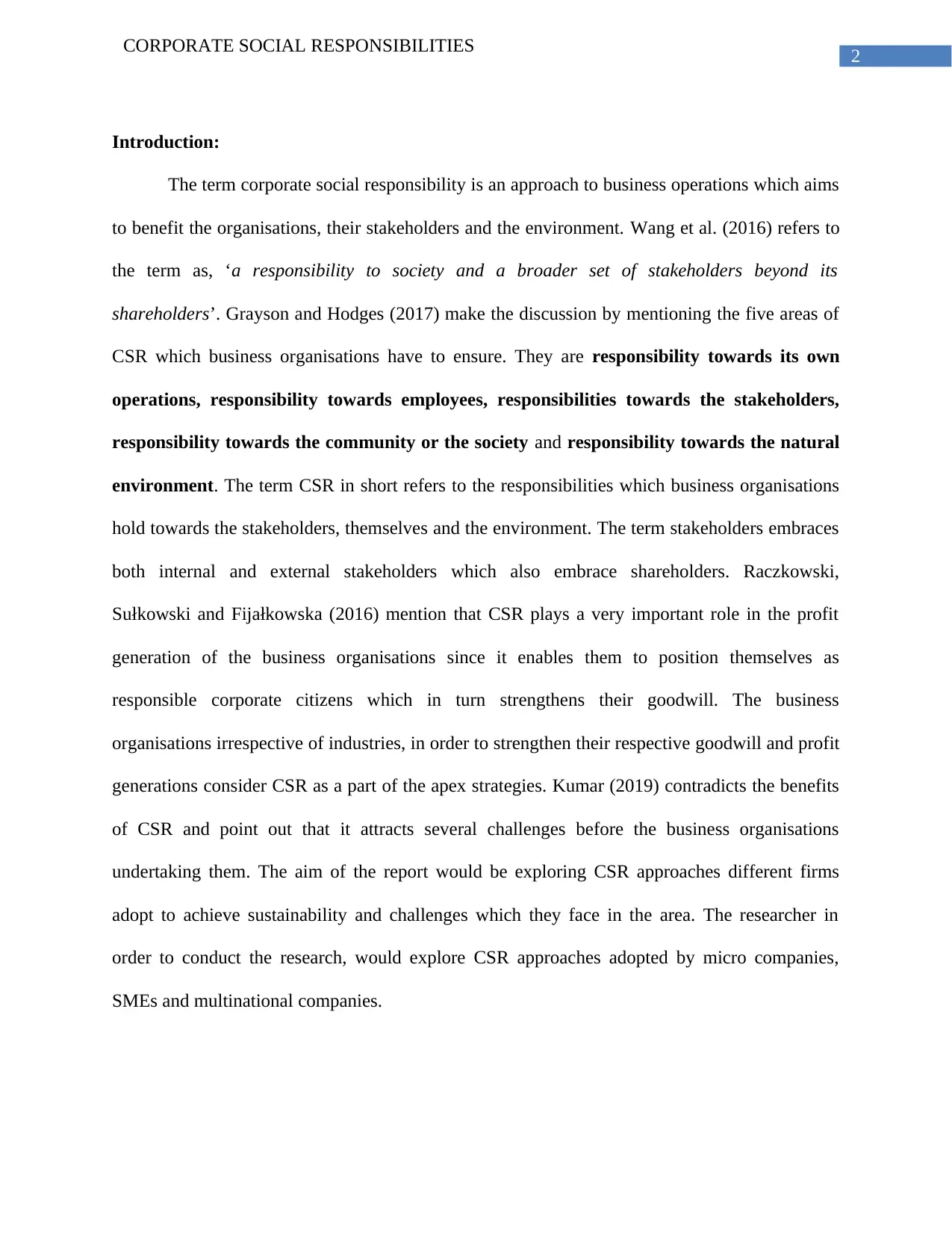
2
CORPORATE SOCIAL RESPONSIBILITIES
Introduction:
The term corporate social responsibility is an approach to business operations which aims
to benefit the organisations, their stakeholders and the environment. Wang et al. (2016) refers to
the term as, ‘a responsibility to society and a broader set of stakeholders beyond its
shareholders’. Grayson and Hodges (2017) make the discussion by mentioning the five areas of
CSR which business organisations have to ensure. They are responsibility towards its own
operations, responsibility towards employees, responsibilities towards the stakeholders,
responsibility towards the community or the society and responsibility towards the natural
environment. The term CSR in short refers to the responsibilities which business organisations
hold towards the stakeholders, themselves and the environment. The term stakeholders embraces
both internal and external stakeholders which also embrace shareholders. Raczkowski,
Sułkowski and Fijałkowska (2016) mention that CSR plays a very important role in the profit
generation of the business organisations since it enables them to position themselves as
responsible corporate citizens which in turn strengthens their goodwill. The business
organisations irrespective of industries, in order to strengthen their respective goodwill and profit
generations consider CSR as a part of the apex strategies. Kumar (2019) contradicts the benefits
of CSR and point out that it attracts several challenges before the business organisations
undertaking them. The aim of the report would be exploring CSR approaches different firms
adopt to achieve sustainability and challenges which they face in the area. The researcher in
order to conduct the research, would explore CSR approaches adopted by micro companies,
SMEs and multinational companies.
CORPORATE SOCIAL RESPONSIBILITIES
Introduction:
The term corporate social responsibility is an approach to business operations which aims
to benefit the organisations, their stakeholders and the environment. Wang et al. (2016) refers to
the term as, ‘a responsibility to society and a broader set of stakeholders beyond its
shareholders’. Grayson and Hodges (2017) make the discussion by mentioning the five areas of
CSR which business organisations have to ensure. They are responsibility towards its own
operations, responsibility towards employees, responsibilities towards the stakeholders,
responsibility towards the community or the society and responsibility towards the natural
environment. The term CSR in short refers to the responsibilities which business organisations
hold towards the stakeholders, themselves and the environment. The term stakeholders embraces
both internal and external stakeholders which also embrace shareholders. Raczkowski,
Sułkowski and Fijałkowska (2016) mention that CSR plays a very important role in the profit
generation of the business organisations since it enables them to position themselves as
responsible corporate citizens which in turn strengthens their goodwill. The business
organisations irrespective of industries, in order to strengthen their respective goodwill and profit
generations consider CSR as a part of the apex strategies. Kumar (2019) contradicts the benefits
of CSR and point out that it attracts several challenges before the business organisations
undertaking them. The aim of the report would be exploring CSR approaches different firms
adopt to achieve sustainability and challenges which they face in the area. The researcher in
order to conduct the research, would explore CSR approaches adopted by micro companies,
SMEs and multinational companies.
⊘ This is a preview!⊘
Do you want full access?
Subscribe today to unlock all pages.

Trusted by 1+ million students worldwide
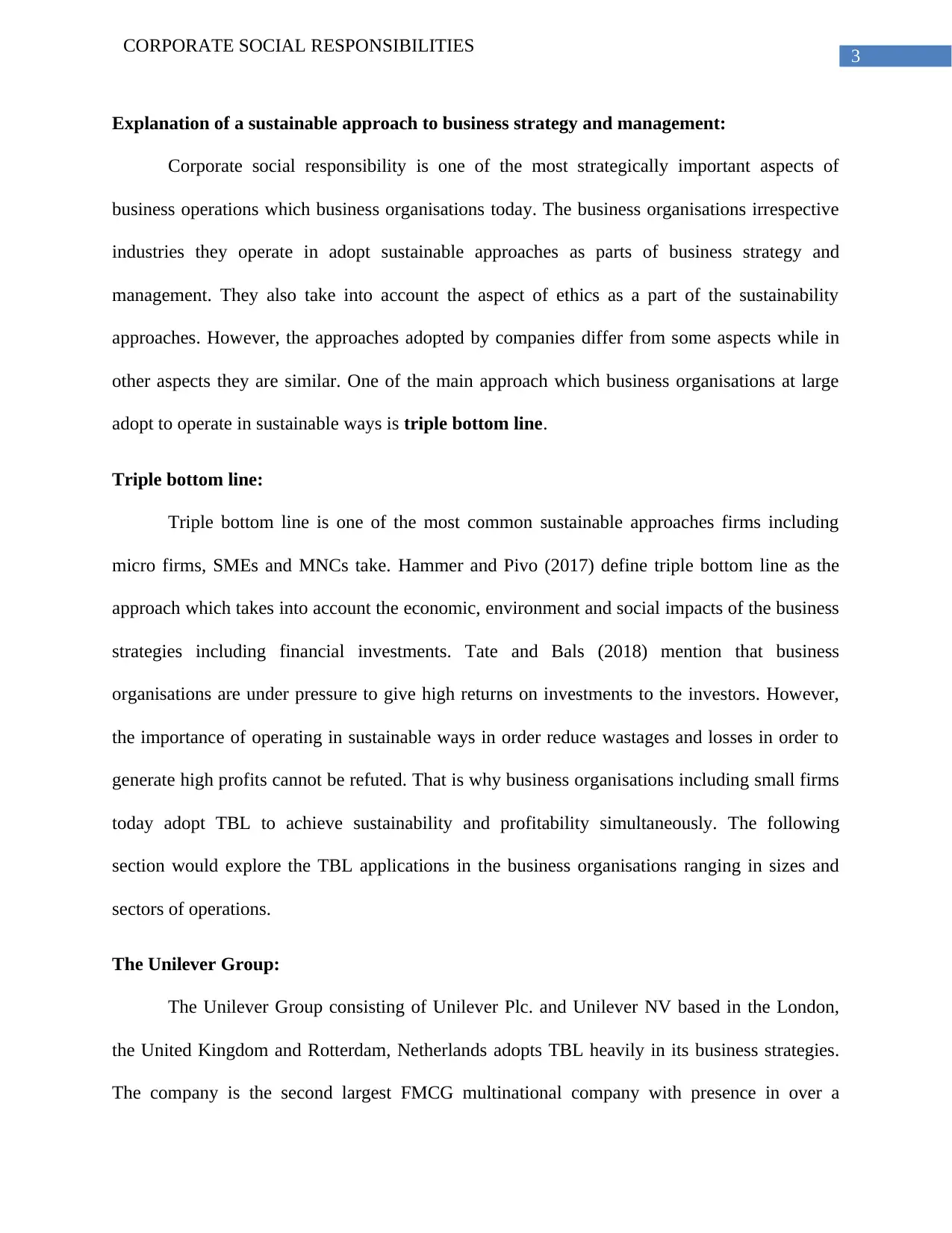
3
CORPORATE SOCIAL RESPONSIBILITIES
Explanation of a sustainable approach to business strategy and management:
Corporate social responsibility is one of the most strategically important aspects of
business operations which business organisations today. The business organisations irrespective
industries they operate in adopt sustainable approaches as parts of business strategy and
management. They also take into account the aspect of ethics as a part of the sustainability
approaches. However, the approaches adopted by companies differ from some aspects while in
other aspects they are similar. One of the main approach which business organisations at large
adopt to operate in sustainable ways is triple bottom line.
Triple bottom line:
Triple bottom line is one of the most common sustainable approaches firms including
micro firms, SMEs and MNCs take. Hammer and Pivo (2017) define triple bottom line as the
approach which takes into account the economic, environment and social impacts of the business
strategies including financial investments. Tate and Bals (2018) mention that business
organisations are under pressure to give high returns on investments to the investors. However,
the importance of operating in sustainable ways in order reduce wastages and losses in order to
generate high profits cannot be refuted. That is why business organisations including small firms
today adopt TBL to achieve sustainability and profitability simultaneously. The following
section would explore the TBL applications in the business organisations ranging in sizes and
sectors of operations.
The Unilever Group:
The Unilever Group consisting of Unilever Plc. and Unilever NV based in the London,
the United Kingdom and Rotterdam, Netherlands adopts TBL heavily in its business strategies.
The company is the second largest FMCG multinational company with presence in over a
CORPORATE SOCIAL RESPONSIBILITIES
Explanation of a sustainable approach to business strategy and management:
Corporate social responsibility is one of the most strategically important aspects of
business operations which business organisations today. The business organisations irrespective
industries they operate in adopt sustainable approaches as parts of business strategy and
management. They also take into account the aspect of ethics as a part of the sustainability
approaches. However, the approaches adopted by companies differ from some aspects while in
other aspects they are similar. One of the main approach which business organisations at large
adopt to operate in sustainable ways is triple bottom line.
Triple bottom line:
Triple bottom line is one of the most common sustainable approaches firms including
micro firms, SMEs and MNCs take. Hammer and Pivo (2017) define triple bottom line as the
approach which takes into account the economic, environment and social impacts of the business
strategies including financial investments. Tate and Bals (2018) mention that business
organisations are under pressure to give high returns on investments to the investors. However,
the importance of operating in sustainable ways in order reduce wastages and losses in order to
generate high profits cannot be refuted. That is why business organisations including small firms
today adopt TBL to achieve sustainability and profitability simultaneously. The following
section would explore the TBL applications in the business organisations ranging in sizes and
sectors of operations.
The Unilever Group:
The Unilever Group consisting of Unilever Plc. and Unilever NV based in the London,
the United Kingdom and Rotterdam, Netherlands adopts TBL heavily in its business strategies.
The company is the second largest FMCG multinational company with presence in over a
Paraphrase This Document
Need a fresh take? Get an instant paraphrase of this document with our AI Paraphraser
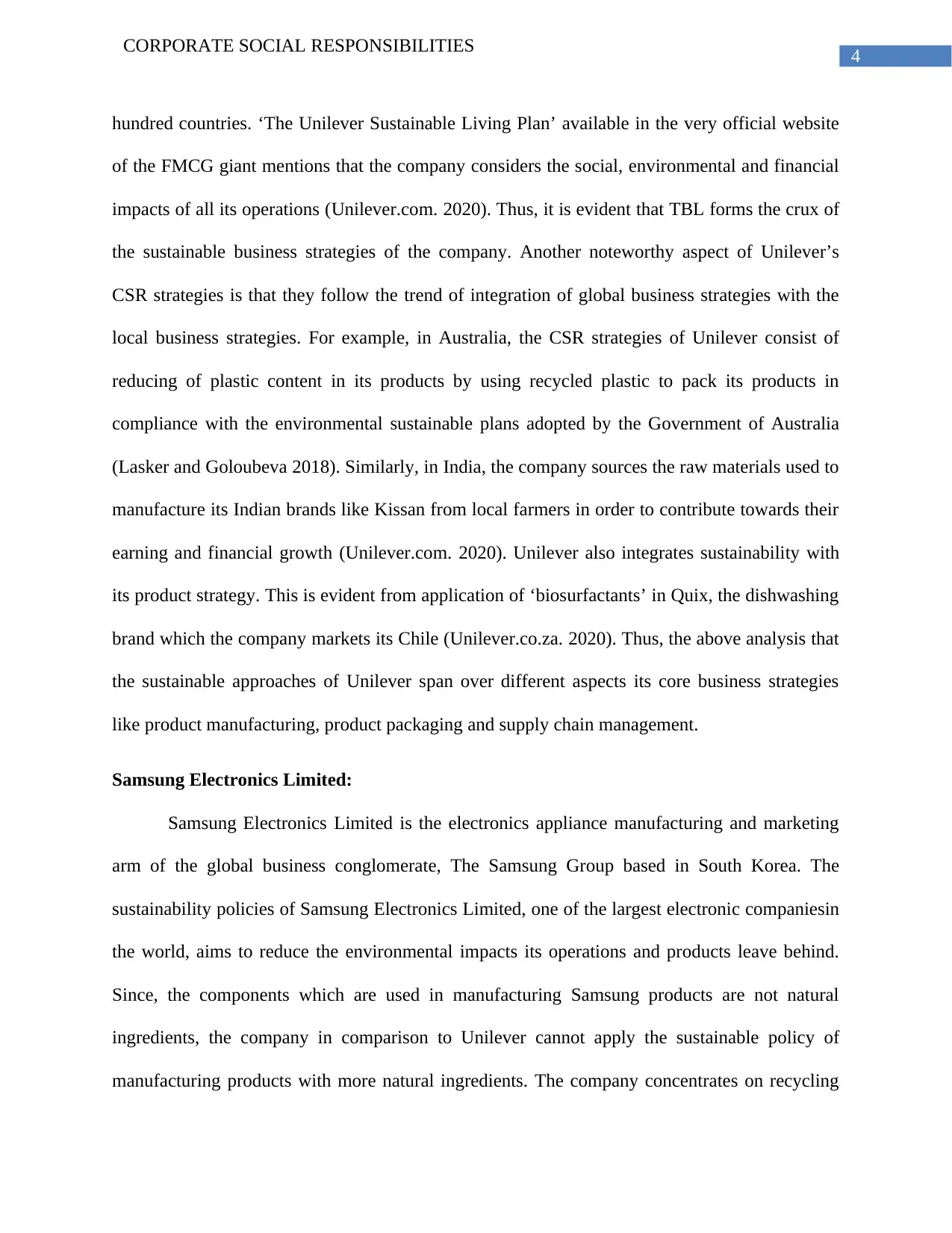
4
CORPORATE SOCIAL RESPONSIBILITIES
hundred countries. ‘The Unilever Sustainable Living Plan’ available in the very official website
of the FMCG giant mentions that the company considers the social, environmental and financial
impacts of all its operations (Unilever.com. 2020). Thus, it is evident that TBL forms the crux of
the sustainable business strategies of the company. Another noteworthy aspect of Unilever’s
CSR strategies is that they follow the trend of integration of global business strategies with the
local business strategies. For example, in Australia, the CSR strategies of Unilever consist of
reducing of plastic content in its products by using recycled plastic to pack its products in
compliance with the environmental sustainable plans adopted by the Government of Australia
(Lasker and Goloubeva 2018). Similarly, in India, the company sources the raw materials used to
manufacture its Indian brands like Kissan from local farmers in order to contribute towards their
earning and financial growth (Unilever.com. 2020). Unilever also integrates sustainability with
its product strategy. This is evident from application of ‘biosurfactants’ in Quix, the dishwashing
brand which the company markets its Chile (Unilever.co.za. 2020). Thus, the above analysis that
the sustainable approaches of Unilever span over different aspects its core business strategies
like product manufacturing, product packaging and supply chain management.
Samsung Electronics Limited:
Samsung Electronics Limited is the electronics appliance manufacturing and marketing
arm of the global business conglomerate, The Samsung Group based in South Korea. The
sustainability policies of Samsung Electronics Limited, one of the largest electronic companiesin
the world, aims to reduce the environmental impacts its operations and products leave behind.
Since, the components which are used in manufacturing Samsung products are not natural
ingredients, the company in comparison to Unilever cannot apply the sustainable policy of
manufacturing products with more natural ingredients. The company concentrates on recycling
CORPORATE SOCIAL RESPONSIBILITIES
hundred countries. ‘The Unilever Sustainable Living Plan’ available in the very official website
of the FMCG giant mentions that the company considers the social, environmental and financial
impacts of all its operations (Unilever.com. 2020). Thus, it is evident that TBL forms the crux of
the sustainable business strategies of the company. Another noteworthy aspect of Unilever’s
CSR strategies is that they follow the trend of integration of global business strategies with the
local business strategies. For example, in Australia, the CSR strategies of Unilever consist of
reducing of plastic content in its products by using recycled plastic to pack its products in
compliance with the environmental sustainable plans adopted by the Government of Australia
(Lasker and Goloubeva 2018). Similarly, in India, the company sources the raw materials used to
manufacture its Indian brands like Kissan from local farmers in order to contribute towards their
earning and financial growth (Unilever.com. 2020). Unilever also integrates sustainability with
its product strategy. This is evident from application of ‘biosurfactants’ in Quix, the dishwashing
brand which the company markets its Chile (Unilever.co.za. 2020). Thus, the above analysis that
the sustainable approaches of Unilever span over different aspects its core business strategies
like product manufacturing, product packaging and supply chain management.
Samsung Electronics Limited:
Samsung Electronics Limited is the electronics appliance manufacturing and marketing
arm of the global business conglomerate, The Samsung Group based in South Korea. The
sustainability policies of Samsung Electronics Limited, one of the largest electronic companiesin
the world, aims to reduce the environmental impacts its operations and products leave behind.
Since, the components which are used in manufacturing Samsung products are not natural
ingredients, the company in comparison to Unilever cannot apply the sustainable policy of
manufacturing products with more natural ingredients. The company concentrates on recycling
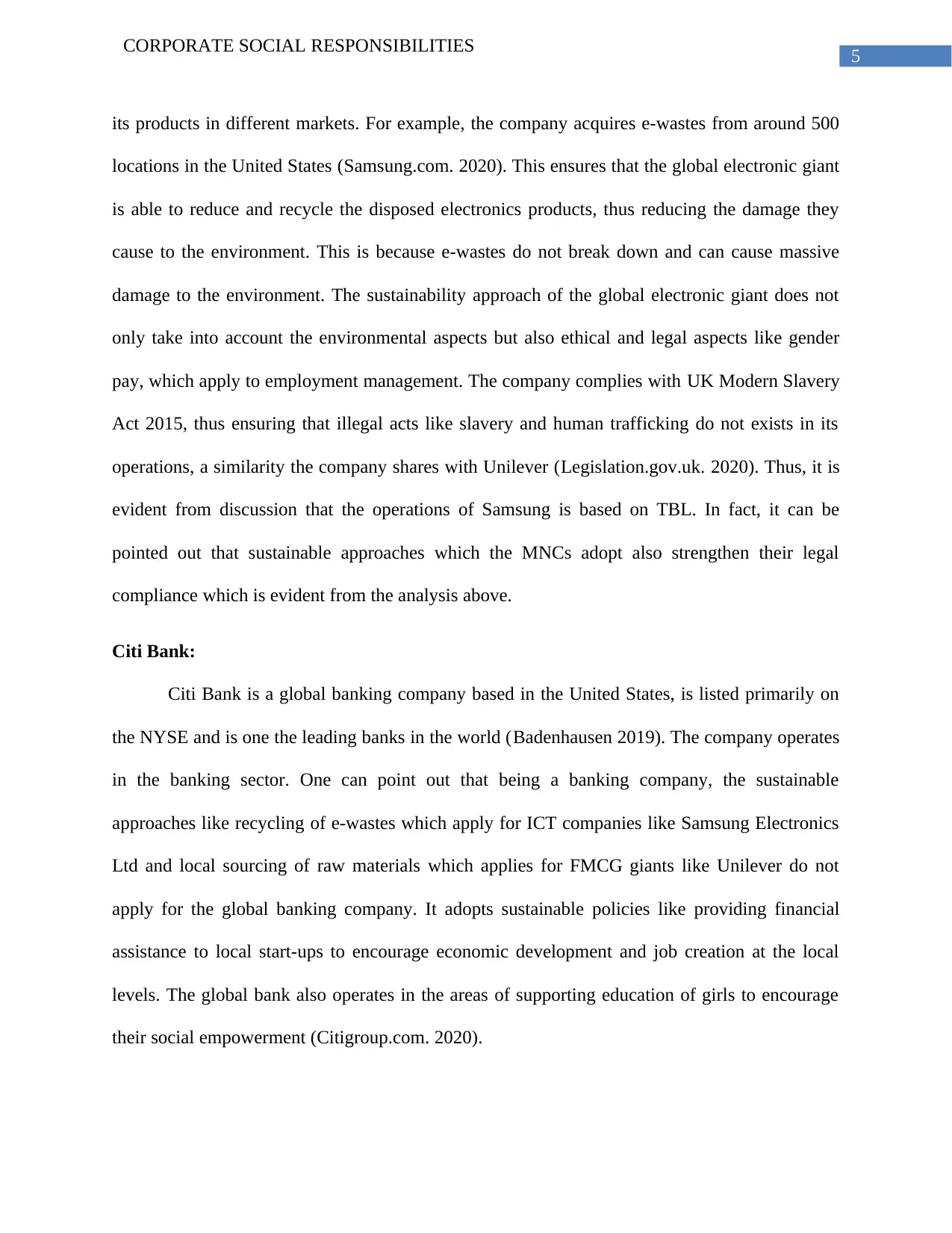
5
CORPORATE SOCIAL RESPONSIBILITIES
its products in different markets. For example, the company acquires e-wastes from around 500
locations in the United States (Samsung.com. 2020). This ensures that the global electronic giant
is able to reduce and recycle the disposed electronics products, thus reducing the damage they
cause to the environment. This is because e-wastes do not break down and can cause massive
damage to the environment. The sustainability approach of the global electronic giant does not
only take into account the environmental aspects but also ethical and legal aspects like gender
pay, which apply to employment management. The company complies with UK Modern Slavery
Act 2015, thus ensuring that illegal acts like slavery and human trafficking do not exists in its
operations, a similarity the company shares with Unilever (Legislation.gov.uk. 2020). Thus, it is
evident from discussion that the operations of Samsung is based on TBL. In fact, it can be
pointed out that sustainable approaches which the MNCs adopt also strengthen their legal
compliance which is evident from the analysis above.
Citi Bank:
Citi Bank is a global banking company based in the United States, is listed primarily on
the NYSE and is one the leading banks in the world (Badenhausen 2019). The company operates
in the banking sector. One can point out that being a banking company, the sustainable
approaches like recycling of e-wastes which apply for ICT companies like Samsung Electronics
Ltd and local sourcing of raw materials which applies for FMCG giants like Unilever do not
apply for the global banking company. It adopts sustainable policies like providing financial
assistance to local start-ups to encourage economic development and job creation at the local
levels. The global bank also operates in the areas of supporting education of girls to encourage
their social empowerment (Citigroup.com. 2020).
CORPORATE SOCIAL RESPONSIBILITIES
its products in different markets. For example, the company acquires e-wastes from around 500
locations in the United States (Samsung.com. 2020). This ensures that the global electronic giant
is able to reduce and recycle the disposed electronics products, thus reducing the damage they
cause to the environment. This is because e-wastes do not break down and can cause massive
damage to the environment. The sustainability approach of the global electronic giant does not
only take into account the environmental aspects but also ethical and legal aspects like gender
pay, which apply to employment management. The company complies with UK Modern Slavery
Act 2015, thus ensuring that illegal acts like slavery and human trafficking do not exists in its
operations, a similarity the company shares with Unilever (Legislation.gov.uk. 2020). Thus, it is
evident from discussion that the operations of Samsung is based on TBL. In fact, it can be
pointed out that sustainable approaches which the MNCs adopt also strengthen their legal
compliance which is evident from the analysis above.
Citi Bank:
Citi Bank is a global banking company based in the United States, is listed primarily on
the NYSE and is one the leading banks in the world (Badenhausen 2019). The company operates
in the banking sector. One can point out that being a banking company, the sustainable
approaches like recycling of e-wastes which apply for ICT companies like Samsung Electronics
Ltd and local sourcing of raw materials which applies for FMCG giants like Unilever do not
apply for the global banking company. It adopts sustainable policies like providing financial
assistance to local start-ups to encourage economic development and job creation at the local
levels. The global bank also operates in the areas of supporting education of girls to encourage
their social empowerment (Citigroup.com. 2020).
⊘ This is a preview!⊘
Do you want full access?
Subscribe today to unlock all pages.

Trusted by 1+ million students worldwide
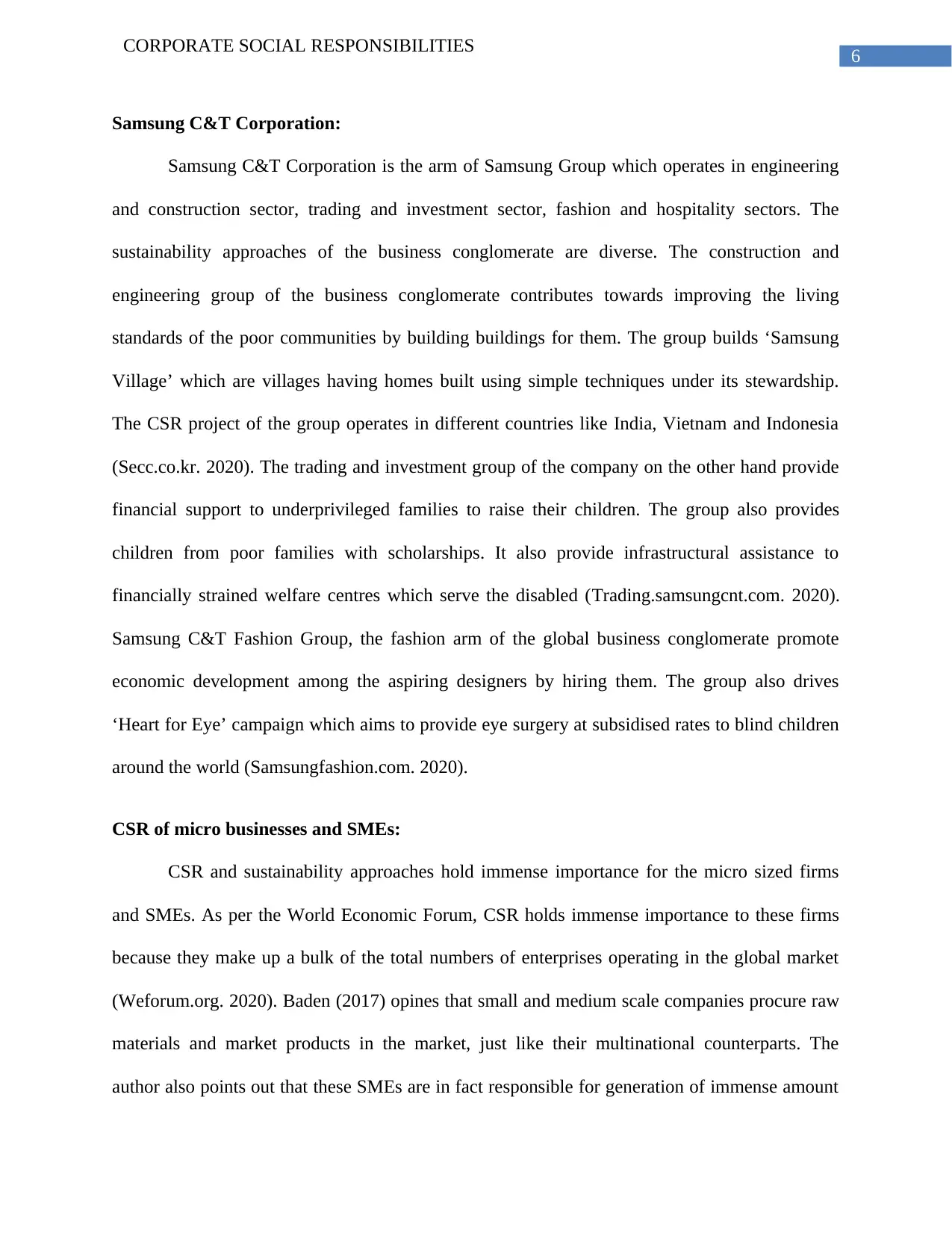
6
CORPORATE SOCIAL RESPONSIBILITIES
Samsung C&T Corporation:
Samsung C&T Corporation is the arm of Samsung Group which operates in engineering
and construction sector, trading and investment sector, fashion and hospitality sectors. The
sustainability approaches of the business conglomerate are diverse. The construction and
engineering group of the business conglomerate contributes towards improving the living
standards of the poor communities by building buildings for them. The group builds ‘Samsung
Village’ which are villages having homes built using simple techniques under its stewardship.
The CSR project of the group operates in different countries like India, Vietnam and Indonesia
(Secc.co.kr. 2020). The trading and investment group of the company on the other hand provide
financial support to underprivileged families to raise their children. The group also provides
children from poor families with scholarships. It also provide infrastructural assistance to
financially strained welfare centres which serve the disabled (Trading.samsungcnt.com. 2020).
Samsung C&T Fashion Group, the fashion arm of the global business conglomerate promote
economic development among the aspiring designers by hiring them. The group also drives
‘Heart for Eye’ campaign which aims to provide eye surgery at subsidised rates to blind children
around the world (Samsungfashion.com. 2020).
CSR of micro businesses and SMEs:
CSR and sustainability approaches hold immense importance for the micro sized firms
and SMEs. As per the World Economic Forum, CSR holds immense importance to these firms
because they make up a bulk of the total numbers of enterprises operating in the global market
(Weforum.org. 2020). Baden (2017) opines that small and medium scale companies procure raw
materials and market products in the market, just like their multinational counterparts. The
author also points out that these SMEs are in fact responsible for generation of immense amount
CORPORATE SOCIAL RESPONSIBILITIES
Samsung C&T Corporation:
Samsung C&T Corporation is the arm of Samsung Group which operates in engineering
and construction sector, trading and investment sector, fashion and hospitality sectors. The
sustainability approaches of the business conglomerate are diverse. The construction and
engineering group of the business conglomerate contributes towards improving the living
standards of the poor communities by building buildings for them. The group builds ‘Samsung
Village’ which are villages having homes built using simple techniques under its stewardship.
The CSR project of the group operates in different countries like India, Vietnam and Indonesia
(Secc.co.kr. 2020). The trading and investment group of the company on the other hand provide
financial support to underprivileged families to raise their children. The group also provides
children from poor families with scholarships. It also provide infrastructural assistance to
financially strained welfare centres which serve the disabled (Trading.samsungcnt.com. 2020).
Samsung C&T Fashion Group, the fashion arm of the global business conglomerate promote
economic development among the aspiring designers by hiring them. The group also drives
‘Heart for Eye’ campaign which aims to provide eye surgery at subsidised rates to blind children
around the world (Samsungfashion.com. 2020).
CSR of micro businesses and SMEs:
CSR and sustainability approaches hold immense importance for the micro sized firms
and SMEs. As per the World Economic Forum, CSR holds immense importance to these firms
because they make up a bulk of the total numbers of enterprises operating in the global market
(Weforum.org. 2020). Baden (2017) opines that small and medium scale companies procure raw
materials and market products in the market, just like their multinational counterparts. The
author also points out that these SMEs are in fact responsible for generation of immense amount
Paraphrase This Document
Need a fresh take? Get an instant paraphrase of this document with our AI Paraphraser
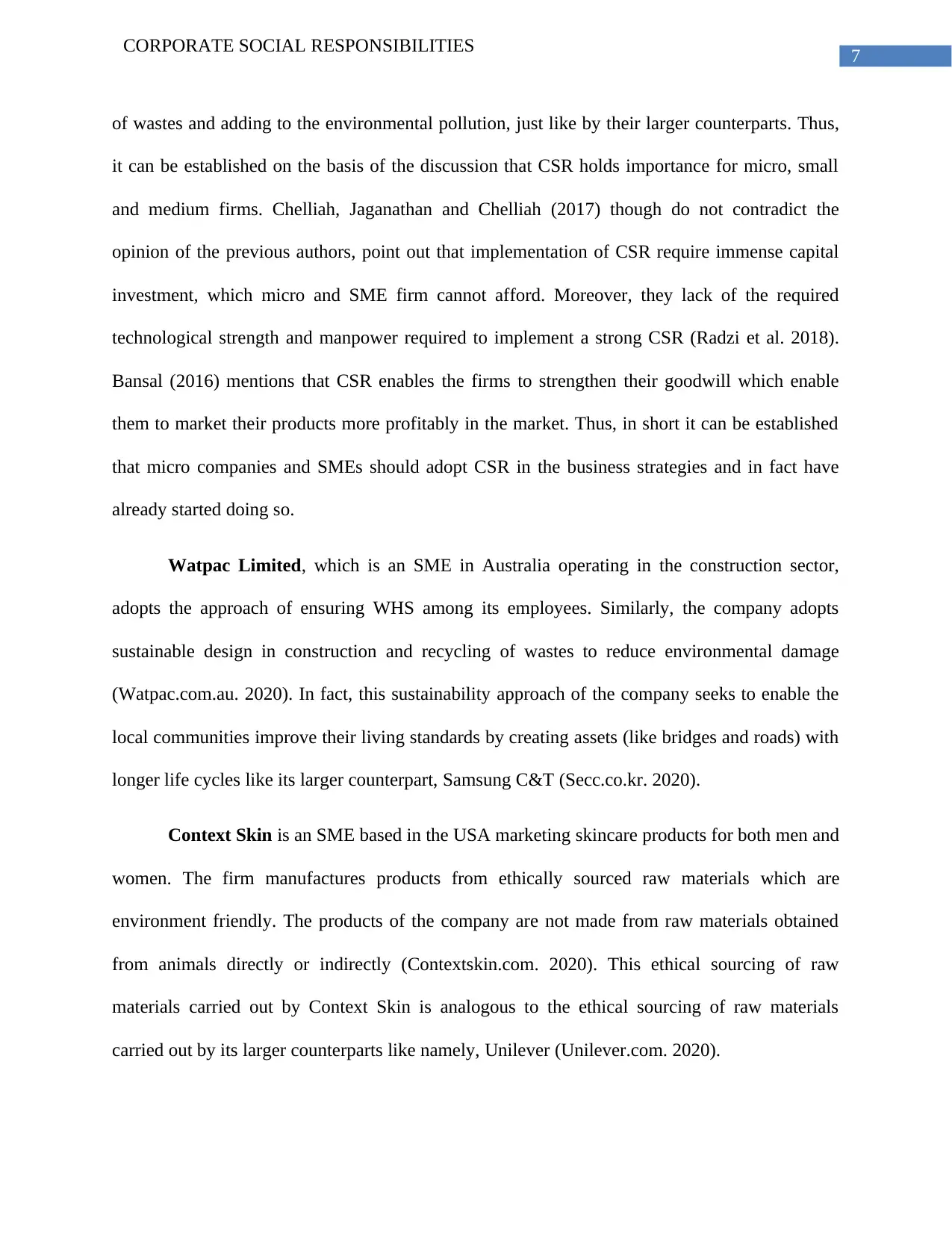
7
CORPORATE SOCIAL RESPONSIBILITIES
of wastes and adding to the environmental pollution, just like by their larger counterparts. Thus,
it can be established on the basis of the discussion that CSR holds importance for micro, small
and medium firms. Chelliah, Jaganathan and Chelliah (2017) though do not contradict the
opinion of the previous authors, point out that implementation of CSR require immense capital
investment, which micro and SME firm cannot afford. Moreover, they lack of the required
technological strength and manpower required to implement a strong CSR (Radzi et al. 2018).
Bansal (2016) mentions that CSR enables the firms to strengthen their goodwill which enable
them to market their products more profitably in the market. Thus, in short it can be established
that micro companies and SMEs should adopt CSR in the business strategies and in fact have
already started doing so.
Watpac Limited, which is an SME in Australia operating in the construction sector,
adopts the approach of ensuring WHS among its employees. Similarly, the company adopts
sustainable design in construction and recycling of wastes to reduce environmental damage
(Watpac.com.au. 2020). In fact, this sustainability approach of the company seeks to enable the
local communities improve their living standards by creating assets (like bridges and roads) with
longer life cycles like its larger counterpart, Samsung C&T (Secc.co.kr. 2020).
Context Skin is an SME based in the USA marketing skincare products for both men and
women. The firm manufactures products from ethically sourced raw materials which are
environment friendly. The products of the company are not made from raw materials obtained
from animals directly or indirectly (Contextskin.com. 2020). This ethical sourcing of raw
materials carried out by Context Skin is analogous to the ethical sourcing of raw materials
carried out by its larger counterparts like namely, Unilever (Unilever.com. 2020).
CORPORATE SOCIAL RESPONSIBILITIES
of wastes and adding to the environmental pollution, just like by their larger counterparts. Thus,
it can be established on the basis of the discussion that CSR holds importance for micro, small
and medium firms. Chelliah, Jaganathan and Chelliah (2017) though do not contradict the
opinion of the previous authors, point out that implementation of CSR require immense capital
investment, which micro and SME firm cannot afford. Moreover, they lack of the required
technological strength and manpower required to implement a strong CSR (Radzi et al. 2018).
Bansal (2016) mentions that CSR enables the firms to strengthen their goodwill which enable
them to market their products more profitably in the market. Thus, in short it can be established
that micro companies and SMEs should adopt CSR in the business strategies and in fact have
already started doing so.
Watpac Limited, which is an SME in Australia operating in the construction sector,
adopts the approach of ensuring WHS among its employees. Similarly, the company adopts
sustainable design in construction and recycling of wastes to reduce environmental damage
(Watpac.com.au. 2020). In fact, this sustainability approach of the company seeks to enable the
local communities improve their living standards by creating assets (like bridges and roads) with
longer life cycles like its larger counterpart, Samsung C&T (Secc.co.kr. 2020).
Context Skin is an SME based in the USA marketing skincare products for both men and
women. The firm manufactures products from ethically sourced raw materials which are
environment friendly. The products of the company are not made from raw materials obtained
from animals directly or indirectly (Contextskin.com. 2020). This ethical sourcing of raw
materials carried out by Context Skin is analogous to the ethical sourcing of raw materials
carried out by its larger counterparts like namely, Unilever (Unilever.com. 2020).
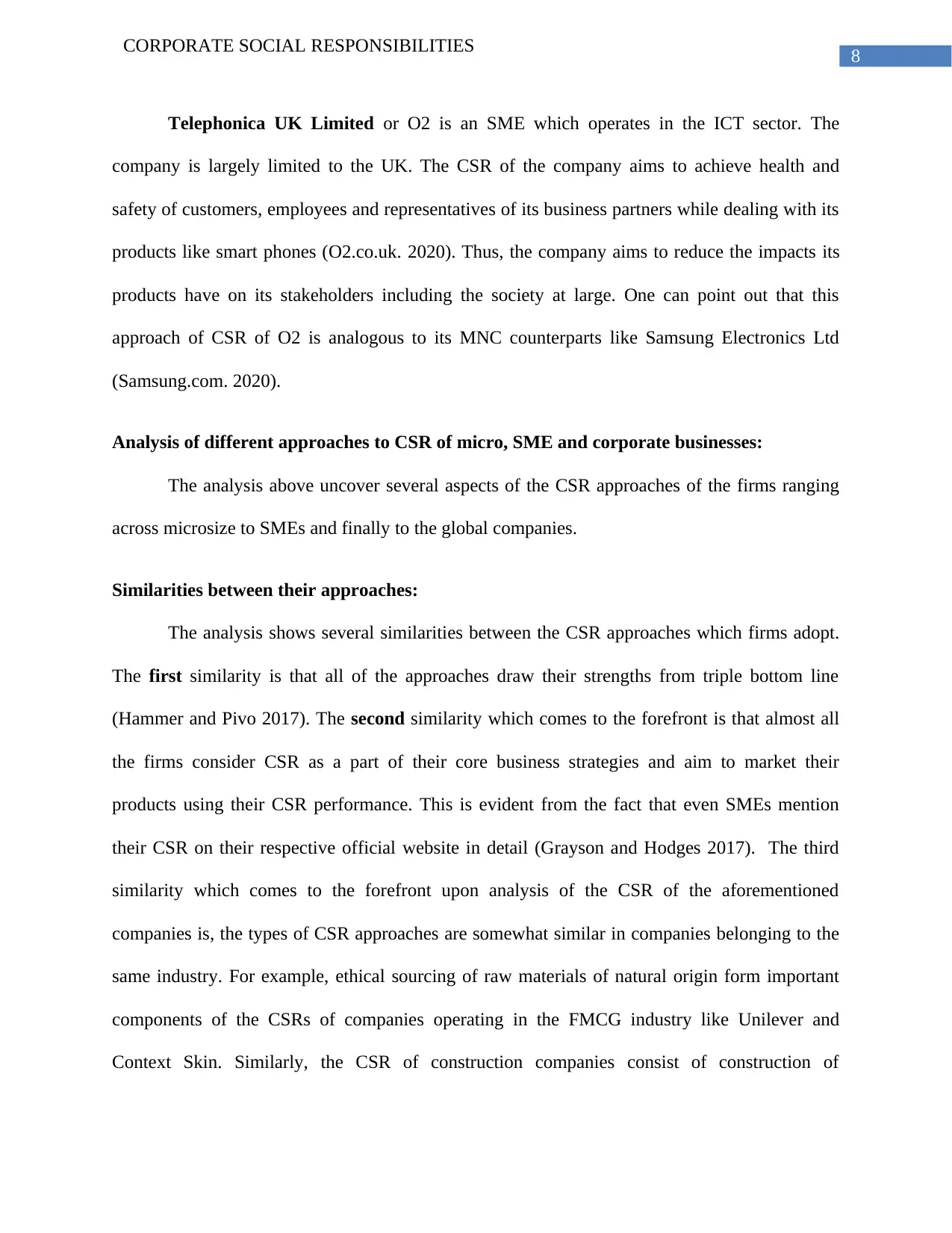
8
CORPORATE SOCIAL RESPONSIBILITIES
Telephonica UK Limited or O2 is an SME which operates in the ICT sector. The
company is largely limited to the UK. The CSR of the company aims to achieve health and
safety of customers, employees and representatives of its business partners while dealing with its
products like smart phones (O2.co.uk. 2020). Thus, the company aims to reduce the impacts its
products have on its stakeholders including the society at large. One can point out that this
approach of CSR of O2 is analogous to its MNC counterparts like Samsung Electronics Ltd
(Samsung.com. 2020).
Analysis of different approaches to CSR of micro, SME and corporate businesses:
The analysis above uncover several aspects of the CSR approaches of the firms ranging
across microsize to SMEs and finally to the global companies.
Similarities between their approaches:
The analysis shows several similarities between the CSR approaches which firms adopt.
The first similarity is that all of the approaches draw their strengths from triple bottom line
(Hammer and Pivo 2017). The second similarity which comes to the forefront is that almost all
the firms consider CSR as a part of their core business strategies and aim to market their
products using their CSR performance. This is evident from the fact that even SMEs mention
their CSR on their respective official website in detail (Grayson and Hodges 2017). The third
similarity which comes to the forefront upon analysis of the CSR of the aforementioned
companies is, the types of CSR approaches are somewhat similar in companies belonging to the
same industry. For example, ethical sourcing of raw materials of natural origin form important
components of the CSRs of companies operating in the FMCG industry like Unilever and
Context Skin. Similarly, the CSR of construction companies consist of construction of
CORPORATE SOCIAL RESPONSIBILITIES
Telephonica UK Limited or O2 is an SME which operates in the ICT sector. The
company is largely limited to the UK. The CSR of the company aims to achieve health and
safety of customers, employees and representatives of its business partners while dealing with its
products like smart phones (O2.co.uk. 2020). Thus, the company aims to reduce the impacts its
products have on its stakeholders including the society at large. One can point out that this
approach of CSR of O2 is analogous to its MNC counterparts like Samsung Electronics Ltd
(Samsung.com. 2020).
Analysis of different approaches to CSR of micro, SME and corporate businesses:
The analysis above uncover several aspects of the CSR approaches of the firms ranging
across microsize to SMEs and finally to the global companies.
Similarities between their approaches:
The analysis shows several similarities between the CSR approaches which firms adopt.
The first similarity is that all of the approaches draw their strengths from triple bottom line
(Hammer and Pivo 2017). The second similarity which comes to the forefront is that almost all
the firms consider CSR as a part of their core business strategies and aim to market their
products using their CSR performance. This is evident from the fact that even SMEs mention
their CSR on their respective official website in detail (Grayson and Hodges 2017). The third
similarity which comes to the forefront upon analysis of the CSR of the aforementioned
companies is, the types of CSR approaches are somewhat similar in companies belonging to the
same industry. For example, ethical sourcing of raw materials of natural origin form important
components of the CSRs of companies operating in the FMCG industry like Unilever and
Context Skin. Similarly, the CSR of construction companies consist of construction of
⊘ This is a preview!⊘
Do you want full access?
Subscribe today to unlock all pages.

Trusted by 1+ million students worldwide
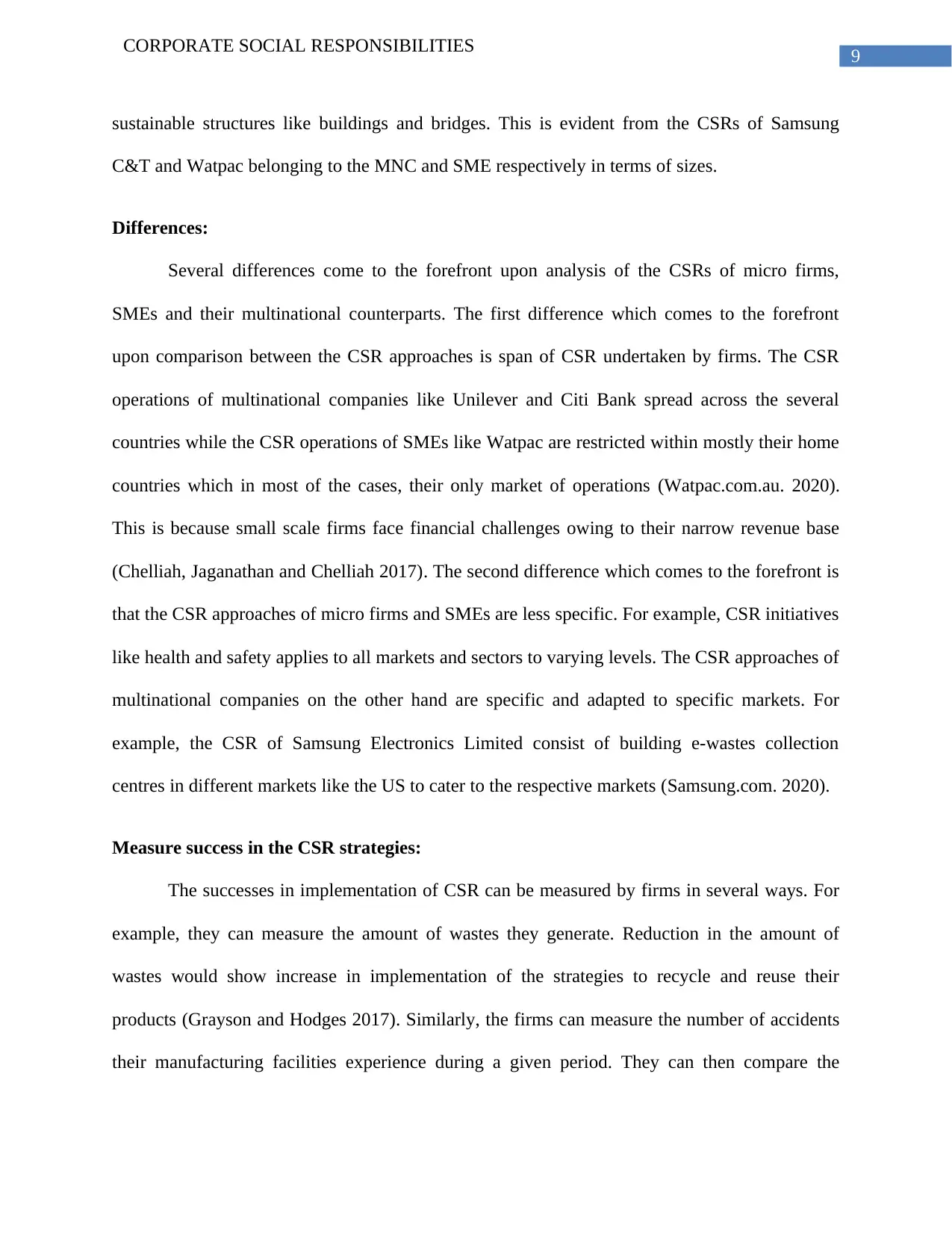
9
CORPORATE SOCIAL RESPONSIBILITIES
sustainable structures like buildings and bridges. This is evident from the CSRs of Samsung
C&T and Watpac belonging to the MNC and SME respectively in terms of sizes.
Differences:
Several differences come to the forefront upon analysis of the CSRs of micro firms,
SMEs and their multinational counterparts. The first difference which comes to the forefront
upon comparison between the CSR approaches is span of CSR undertaken by firms. The CSR
operations of multinational companies like Unilever and Citi Bank spread across the several
countries while the CSR operations of SMEs like Watpac are restricted within mostly their home
countries which in most of the cases, their only market of operations (Watpac.com.au. 2020).
This is because small scale firms face financial challenges owing to their narrow revenue base
(Chelliah, Jaganathan and Chelliah 2017). The second difference which comes to the forefront is
that the CSR approaches of micro firms and SMEs are less specific. For example, CSR initiatives
like health and safety applies to all markets and sectors to varying levels. The CSR approaches of
multinational companies on the other hand are specific and adapted to specific markets. For
example, the CSR of Samsung Electronics Limited consist of building e-wastes collection
centres in different markets like the US to cater to the respective markets (Samsung.com. 2020).
Measure success in the CSR strategies:
The successes in implementation of CSR can be measured by firms in several ways. For
example, they can measure the amount of wastes they generate. Reduction in the amount of
wastes would show increase in implementation of the strategies to recycle and reuse their
products (Grayson and Hodges 2017). Similarly, the firms can measure the number of accidents
their manufacturing facilities experience during a given period. They can then compare the
CORPORATE SOCIAL RESPONSIBILITIES
sustainable structures like buildings and bridges. This is evident from the CSRs of Samsung
C&T and Watpac belonging to the MNC and SME respectively in terms of sizes.
Differences:
Several differences come to the forefront upon analysis of the CSRs of micro firms,
SMEs and their multinational counterparts. The first difference which comes to the forefront
upon comparison between the CSR approaches is span of CSR undertaken by firms. The CSR
operations of multinational companies like Unilever and Citi Bank spread across the several
countries while the CSR operations of SMEs like Watpac are restricted within mostly their home
countries which in most of the cases, their only market of operations (Watpac.com.au. 2020).
This is because small scale firms face financial challenges owing to their narrow revenue base
(Chelliah, Jaganathan and Chelliah 2017). The second difference which comes to the forefront is
that the CSR approaches of micro firms and SMEs are less specific. For example, CSR initiatives
like health and safety applies to all markets and sectors to varying levels. The CSR approaches of
multinational companies on the other hand are specific and adapted to specific markets. For
example, the CSR of Samsung Electronics Limited consist of building e-wastes collection
centres in different markets like the US to cater to the respective markets (Samsung.com. 2020).
Measure success in the CSR strategies:
The successes in implementation of CSR can be measured by firms in several ways. For
example, they can measure the amount of wastes they generate. Reduction in the amount of
wastes would show increase in implementation of the strategies to recycle and reuse their
products (Grayson and Hodges 2017). Similarly, the firms can measure the number of accidents
their manufacturing facilities experience during a given period. They can then compare the
Paraphrase This Document
Need a fresh take? Get an instant paraphrase of this document with our AI Paraphraser
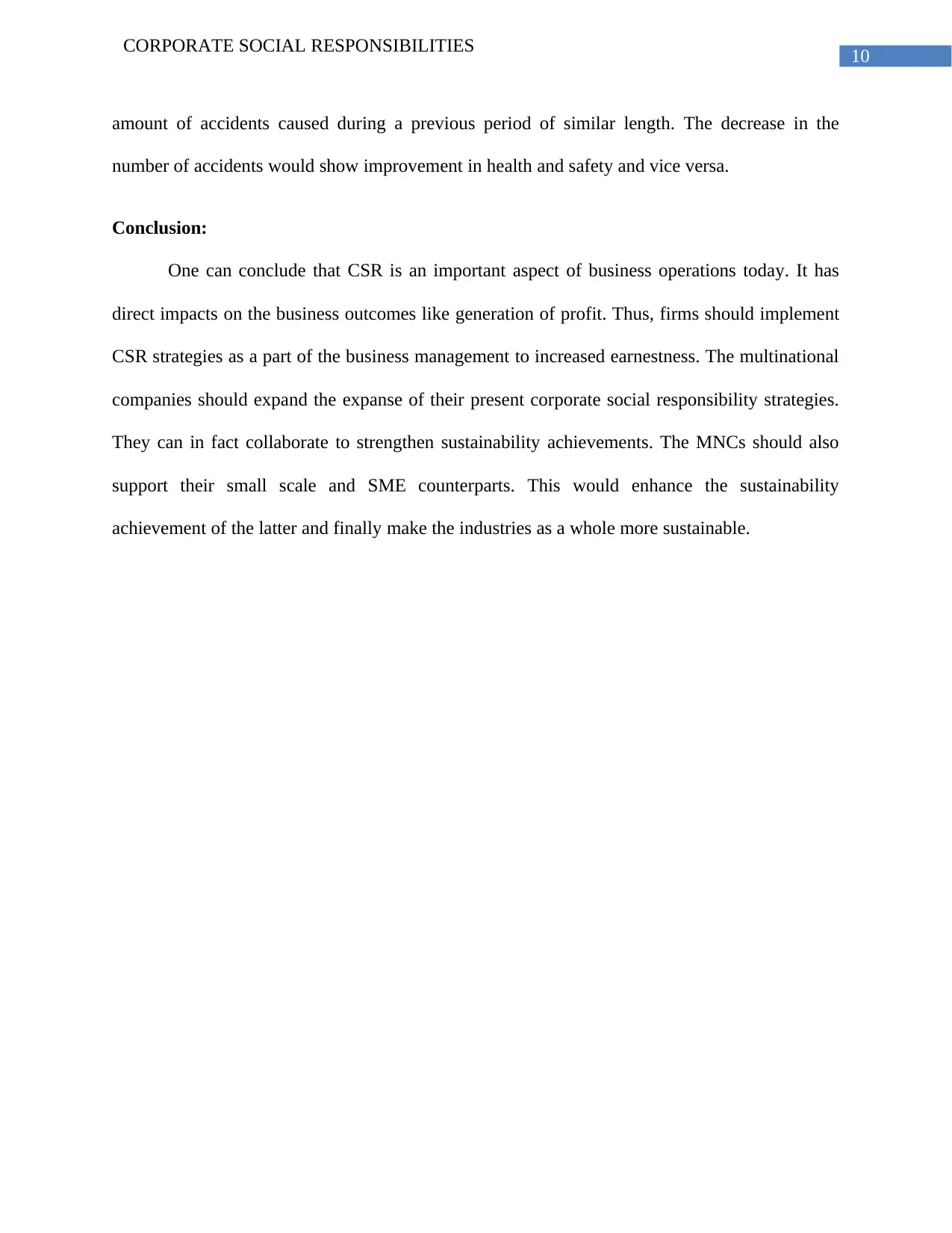
10
CORPORATE SOCIAL RESPONSIBILITIES
amount of accidents caused during a previous period of similar length. The decrease in the
number of accidents would show improvement in health and safety and vice versa.
Conclusion:
One can conclude that CSR is an important aspect of business operations today. It has
direct impacts on the business outcomes like generation of profit. Thus, firms should implement
CSR strategies as a part of the business management to increased earnestness. The multinational
companies should expand the expanse of their present corporate social responsibility strategies.
They can in fact collaborate to strengthen sustainability achievements. The MNCs should also
support their small scale and SME counterparts. This would enhance the sustainability
achievement of the latter and finally make the industries as a whole more sustainable.
CORPORATE SOCIAL RESPONSIBILITIES
amount of accidents caused during a previous period of similar length. The decrease in the
number of accidents would show improvement in health and safety and vice versa.
Conclusion:
One can conclude that CSR is an important aspect of business operations today. It has
direct impacts on the business outcomes like generation of profit. Thus, firms should implement
CSR strategies as a part of the business management to increased earnestness. The multinational
companies should expand the expanse of their present corporate social responsibility strategies.
They can in fact collaborate to strengthen sustainability achievements. The MNCs should also
support their small scale and SME counterparts. This would enhance the sustainability
achievement of the latter and finally make the industries as a whole more sustainable.
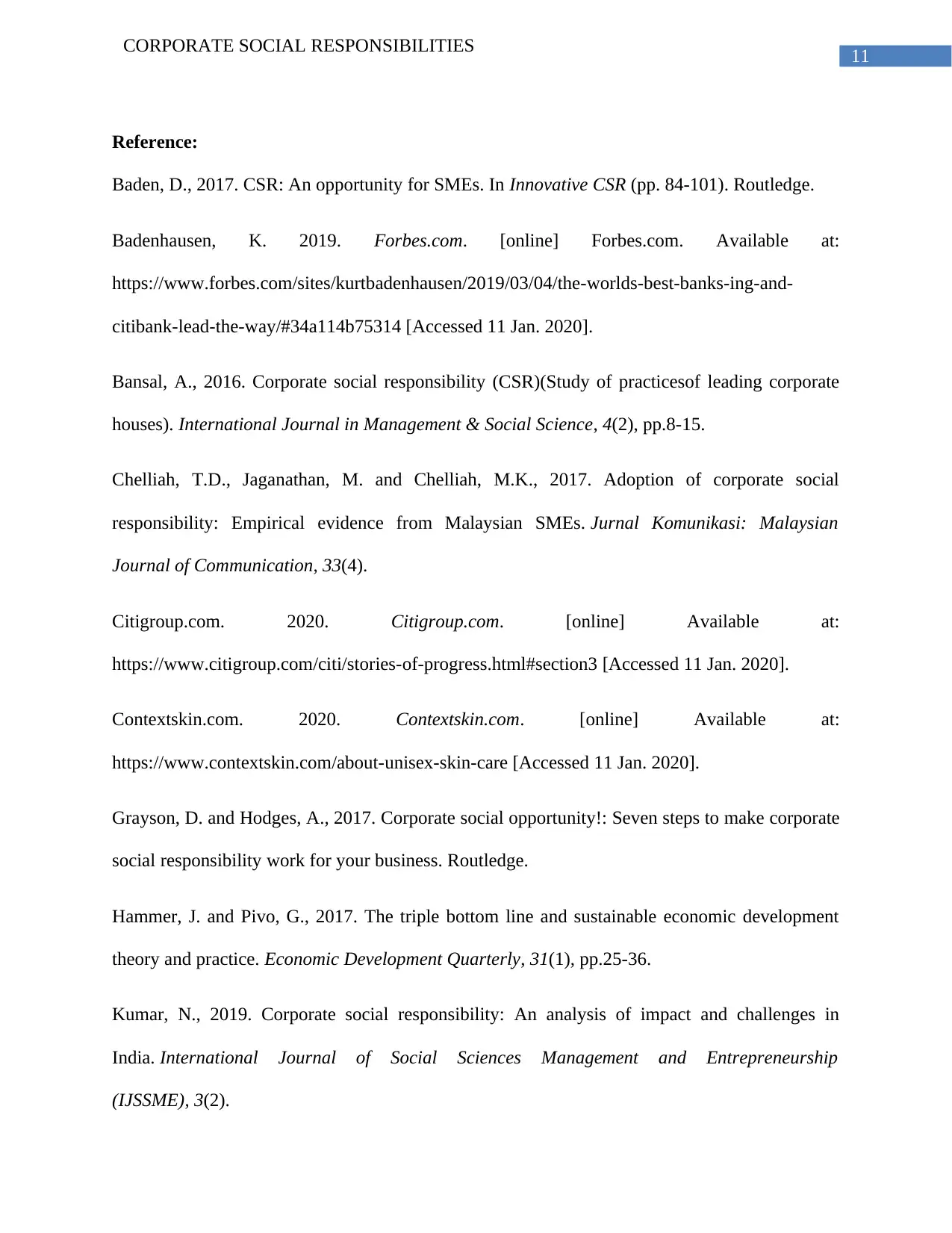
11
CORPORATE SOCIAL RESPONSIBILITIES
Reference:
Baden, D., 2017. CSR: An opportunity for SMEs. In Innovative CSR (pp. 84-101). Routledge.
Badenhausen, K. 2019. Forbes.com. [online] Forbes.com. Available at:
https://www.forbes.com/sites/kurtbadenhausen/2019/03/04/the-worlds-best-banks-ing-and-
citibank-lead-the-way/#34a114b75314 [Accessed 11 Jan. 2020].
Bansal, A., 2016. Corporate social responsibility (CSR)(Study of practicesof leading corporate
houses). International Journal in Management & Social Science, 4(2), pp.8-15.
Chelliah, T.D., Jaganathan, M. and Chelliah, M.K., 2017. Adoption of corporate social
responsibility: Empirical evidence from Malaysian SMEs. Jurnal Komunikasi: Malaysian
Journal of Communication, 33(4).
Citigroup.com. 2020. Citigroup.com. [online] Available at:
https://www.citigroup.com/citi/stories-of-progress.html#section3 [Accessed 11 Jan. 2020].
Contextskin.com. 2020. Contextskin.com. [online] Available at:
https://www.contextskin.com/about-unisex-skin-care [Accessed 11 Jan. 2020].
Grayson, D. and Hodges, A., 2017. Corporate social opportunity!: Seven steps to make corporate
social responsibility work for your business. Routledge.
Hammer, J. and Pivo, G., 2017. The triple bottom line and sustainable economic development
theory and practice. Economic Development Quarterly, 31(1), pp.25-36.
Kumar, N., 2019. Corporate social responsibility: An analysis of impact and challenges in
India. International Journal of Social Sciences Management and Entrepreneurship
(IJSSME), 3(2).
CORPORATE SOCIAL RESPONSIBILITIES
Reference:
Baden, D., 2017. CSR: An opportunity for SMEs. In Innovative CSR (pp. 84-101). Routledge.
Badenhausen, K. 2019. Forbes.com. [online] Forbes.com. Available at:
https://www.forbes.com/sites/kurtbadenhausen/2019/03/04/the-worlds-best-banks-ing-and-
citibank-lead-the-way/#34a114b75314 [Accessed 11 Jan. 2020].
Bansal, A., 2016. Corporate social responsibility (CSR)(Study of practicesof leading corporate
houses). International Journal in Management & Social Science, 4(2), pp.8-15.
Chelliah, T.D., Jaganathan, M. and Chelliah, M.K., 2017. Adoption of corporate social
responsibility: Empirical evidence from Malaysian SMEs. Jurnal Komunikasi: Malaysian
Journal of Communication, 33(4).
Citigroup.com. 2020. Citigroup.com. [online] Available at:
https://www.citigroup.com/citi/stories-of-progress.html#section3 [Accessed 11 Jan. 2020].
Contextskin.com. 2020. Contextskin.com. [online] Available at:
https://www.contextskin.com/about-unisex-skin-care [Accessed 11 Jan. 2020].
Grayson, D. and Hodges, A., 2017. Corporate social opportunity!: Seven steps to make corporate
social responsibility work for your business. Routledge.
Hammer, J. and Pivo, G., 2017. The triple bottom line and sustainable economic development
theory and practice. Economic Development Quarterly, 31(1), pp.25-36.
Kumar, N., 2019. Corporate social responsibility: An analysis of impact and challenges in
India. International Journal of Social Sciences Management and Entrepreneurship
(IJSSME), 3(2).
⊘ This is a preview!⊘
Do you want full access?
Subscribe today to unlock all pages.

Trusted by 1+ million students worldwide
1 out of 14
Related Documents
Your All-in-One AI-Powered Toolkit for Academic Success.
+13062052269
info@desklib.com
Available 24*7 on WhatsApp / Email
![[object Object]](/_next/static/media/star-bottom.7253800d.svg)
Unlock your academic potential
Copyright © 2020–2026 A2Z Services. All Rights Reserved. Developed and managed by ZUCOL.





